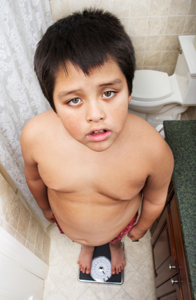 In an opinion piece that ran last week in the Journal of American Medicine, Harvard University child obesity expert Dr. David Ludwig set a fire when he called for parents to lose custody of their obese children.
In an opinion piece that ran last week in the Journal of American Medicine, Harvard University child obesity expert Dr. David Ludwig set a fire when he called for parents to lose custody of their obese children.
“In severe instances of childhood obesity, removal from the home may be justifiable, from a legal standpoint, because of imminent health risks and the parents’ chronic failure to address medical problems,” Ludwig said. Ludwig goes as far as to compare obesity to extreme child abuse. The thought is not without precedent: More than 10 years ago, 3-year-old Anamarie Regino was taken from her parents and placed in foster care simply because she weighed 90 pounds. When questioned about this case, Ludwig admitted that “state intervention is no guarantee of a good outcome, but to do nothing is also not an answer.”
Ludwig has received heat for this point of view, and he’s since clarified his position. He said in later publication that in 99% of the most severe cases, he would not recommend that an obese child be removed from the home. He further explained that state intervention could include financial support to families, social services, access to safe recreation areas and even parenting courses to help manage a child’s uncontrolled eating habits. “The ultimate answer to the obesity epidemic is not to blame parents, it’s to create a more healthful and supportive society,” Ludwig said.
“But until we get there, what do we do about that 14-year-old, 400-pound (182 kg) child who’s not facing increased risk of illness 20 years from now, but who’s facing life-threatening complications today?” he said in an article posted on msnbc.com.
Would this type of situation be a case of the state going too far? Have we truly entered the era of Big Brother? Or is overfeeding your child really and truly equal to beating your child?
Kendra Thiel, California mom of 3, says : “While I also agree that childhood obesity is a problem, just looking at a child’s BMI doesn’t tell the whole story. My 9-year old would probably fall into the obese category if you went strictly by a children’s BMI calculator. What that doesn’t tell you though is that he was 11 lbs. at birth, he is now 5 feet tall, weighs 110 lbs., is solid muscle, and is closely watched by me as well as his doctor. He plays baseball and football, loves to swim, and is otherwise a pretty active kid. He loves cheeseburgers, yes, but more often will choose fruit over less healthy snacks. His doctor is not concerned about his weight or his health and thus, neither am I. Yanking a child out of this situation would definitely be more detrimental than helpful.”
Christina McMenemy, Ohio mom of 2, adds: “I hate when these types of issues are looked at in such a black-and-white manner. Sure, maybe removing a child from the home should be considered an option, but only as a last resort after everything else has been exhausted: genetic testing, counseling, home visits, visits with health care professionals and dietitians, etc. Even if it is a failure of  parenting, the parents need to be given a chance to make changes before taking the drastic step of losing custody.”
parenting, the parents need to be given a chance to make changes before taking the drastic step of losing custody.”
Brooke Randolph, Licensed Mental Health Counselor, has had experience with similar situations. “Obesity could be considered medical neglect if a medical professional has prescribed or suggested that a child loses weight for health reasons or prescribed or suggested specific measures such as a change in diet or increased activity and the parents of said child do not follow through with those suggestions. If a parent refused to purchase medication for a child with HIV, this would also be considered medical neglect. Child Protective Services seems to approach each situation individually, looking for the best way to keep each child safe. Removal of a child from a home is generally not the first step, unless a child is in imminent physical danger. I have heard of cases when CPS became involved with a family as a result of food stored in a refrigerator in metal pots, which the family did not know is considered an inappropriate storage container.”
Randolph adds, “I think it may be more likely that we will see legislation and taxes on junk food before we see children being removed from a home as a result of obesity. I do hope that doctors’ offices that are conflicting with less than cooperative parents can offer courses and/or partner with a therapist to offer courses on techniques to make habit changes and the importance on following through with medical suggestions.”
What do you think? Should obese children be removed from their parents and sent to foster care?
Also Read:
